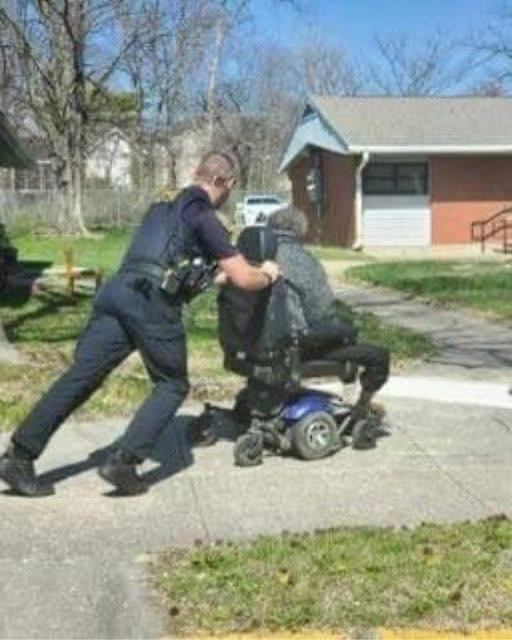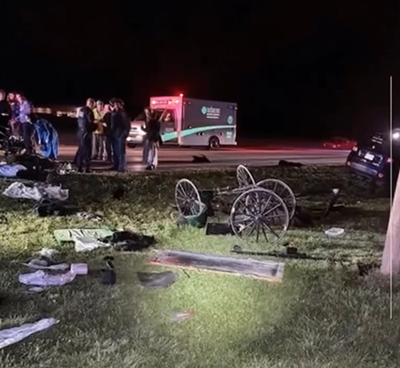The elderly man sat on the sidewalk, his wheelchair powerless. Cars sped by, and people walked past without a glance.
Then, an officer pulled over and approached.
“What’s the problem, sir?” he asked, kneeling beside him.
The man sighed, “Battery’s out. Happens more than I’d like.” His voice was worn, his hands clutching the armrests.
The officer surveyed the scene—no charger, no quick fix. Without hesitation, he placed his hands on the wheelchair and began pushing.
The man blinked. “You don’t have to—”
The officer smiled. “I’ve got you.”
He pushed the man home, block by block. As they neared the house, the elderly man whispered something soft and meaningful, stopping the officer in his tracks.
“What did you say, sir?” the officer asked, leaning closer.
“Reminds me of my grandson,” the man said, his voice trembling.
“Your grandson?” the officer asked.
The man nodded. “He was in the academy too, had the same spirit as you. But he didn’t make it to graduation.”
The officer’s throat tightened. “What happened?”
“A car accident,” the man said, grief in his voice. “He was on his way home from his last day. Just one day away from becoming an officer.”
They continued walking, the weight of the man’s words heavy between them. The officer began to push faster, as if trying to outrun the sorrow.
When they reached the house, the elderly man pointed to a small garden. “He used to play there as a kid,” the man said. The officer noticed a worn baseball mitt on the porch railing.
The man fumbled with his keys, but the officer took over and unlocked the door. Something caught his eye—a photo on the wall: a young man in academy uniform, standing proudly next to the elderly man.
The officer froze. “Wait a minute… this is…”
“Yes,” the man confirmed, “Mark, my grandson. You two graduated together.”
Memories flooded the officer’s mind—long nights at the academy, shared meals, the bond they’d made.
“I remember now,” the officer whispered. “Mark always spoke about you, said you taught him everything about being a good cop.”
The old man smiled softly, but sadness lingered. “And look what happened.”
They sat in silence for a moment, then the officer asked, “May I take some photos of Mark’s things? His uniform, his badge?”
“For what reason?” the man asked, his voice cautious.
“To share his story,” the officer explained. “We’re creating a memorial fund for fallen officers, and Mark’s story could help others connect with the cause.”
The man’s eyes filled with tears, but a small smile appeared. “Mark always said you were the most dedicated, always thinking of others.”
Together, they collected items that told Mark’s story. The officer learned more than he expected—Mark had volunteered at community centers, dreamed of a youth outreach program, and planned to propose to his girlfriend after graduation.
When they finished, the officer helped recharge the wheelchair and promised to return with updates on the memorial fund.
Weeks later, he returned with good news. Mark’s story had inspired overwhelming support—enough to create a scholarship in his name.
“It’s the Mark Thompson Scholarship,” the officer explained, presenting the certificate. “It’ll fund cadets who show the same compassion Mark did.”
The elderly man accepted the certificate with trembling hands, tears streaming down his face. “This means everything to me… and to Mark’s memory.”
Over time, the officer and the man became close friends, working together to choose scholarship recipients and sharing Mark’s legacy.
One evening, as they sat on the porch, the man said, “Mark always believed that service wasn’t about the badge or the gun. It was about making a difference, no matter how small.”
The officer nodded, understanding the deeper truth. Their shared journey had become more than just helping a man in need—it was about honoring a legacy of kindness and service that transcended uniforms.
In the quiet of the evening, with fireflies dancing in Mark’s garden, both men knew they had found something beautiful in the midst of their grief: a testament to the power of compassion and human connection.



